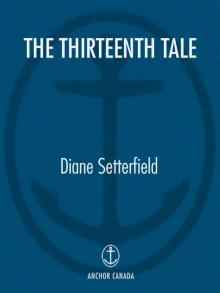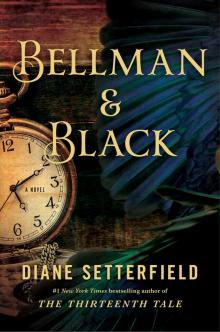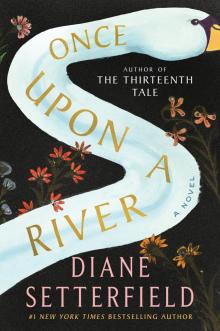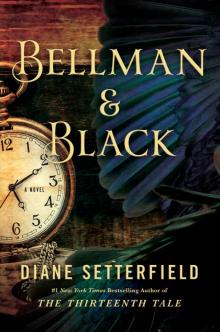- Home
- Diane Setterfield
Once Upon a River Page 5
Once Upon a River Read online
Page 5
Here was the boat, upturned on the grass. She pulled off a glove; her cautious fingers found jagged edges of wood, but then a solid part; she placed her candle there.
She took the box from her pocket and held it for a moment between her teeth while—ignoring the cold—she gathered the folds of her skirt and tucked a bunch of hem into the same pocket so that she could crouch without getting her dress wet. Before her was the dark shimmer of the river. She reached forward and down till she felt it nip viciously at the flesh of her fingers. Good. Opening the tin, she removed from it a glass-and-metal vial with complications impossible to see in the dark. By feel, she immersed the tube in the freezing water and counted. Then she rose and, with all the care her numb fingers could muster, closed the tube for protection in its case and, without bothering to straighten her dress or even retrieve the candle, made her way as swiftly as she could back to the inn.
Inside, the lantern was still glowing in the pilgrims’ room. She held the tube as close to the light as was necessary to read the gauge, then took a notebook and a pencil out of her bag. She wrote the temperature of the water in her notebook.
It wasn’t much. But it was a start.
Rita eased the child off the bed and settled her gently on her lap, in the chair. The little head nodded to rest against her chest. I won’t sleep now, she thought as she arranged the blankets to cover herself and the child. Not after all this. Not in this chair.
As she prepared herself to sit out the night, with scratchy eyes and an aching back, her namesake came to mind. Saint Margaret, who consecrated her virginity to God and was so determined not to marry that she bore the pain of torture sooner than become a wife. She was the patron saint of pregnant women and childbirth. In her early days at the convent, washing the filthy, bloodied sheets, laying out the bodies of the women who died in childbirth, Rita had been rather relieved that her own future was as God’s bride. She would never be sundered by a child emerging from her belly. God had left her, but her commitment to virginity had never wavered.
Rita closed her eyes. Her arms folded around the child, whose sleeping weight rested heavily against her. She felt the rise and fall of the child’s breathing, and measured her own inhalations so that as her chest fell, the child’s expanded; as the child’s fell, her own filled the space. An obscure pleasure took hold of her; she sought drowsily to identify it, name it, and couldn’t.
An idea came floating towards her in the dark.
If she doesn’t belong to this man. If nobody wants her. She could be mine . . .
But before she had time to register her own thinking, the sound of the river, endless and low, filled her mind. It nudged her from the solidity of wakefulness, carried her onto the current of the night, where, without awareness of what was happening, she drifted . . . drifted . . . into the dark sea of sleep.
All were not sleeping, though. The drinkers and the storytellers had some way to walk before they found their beds for the night. One of them turned away from the river on leaving the Swan and skirted the fields to find his way to the barn two miles off where he slept with the horses. He regretted that he had nobody waiting for him, nobody he could shake awake and say, “You won’t believe what’s just happened!” He pictured himself telling the horses what he had witnessed that night, saw their large unbelieving eyes. Nay, they will say, he thought, and that’s a good joke. I’ll remember that. But it wasn’t horses he wanted to tell; the story was too fine to be squandered on animal ears. He turned off the direct path and made a detour to the cottages by Gartin’s fields where his cousin lived.
He knocked.
No one answered, so the story made him knock again, a full-fisted hammering.
In the adjoining cottage, a window was flung up and a woman put her head out in her nightcap to remonstrate with him.
“Wait!” he said. “Hold your scolding till you know what I have come to tell you!”
“Is that you, Fred Heavins?” She peered in the direction the voice was coming from. “Drunken stories, I shouldn’t wonder!” she grumbled. “As if I haven’t heard enough of those to last me a lifetime!”
“I’m not drunk,” he said, offended. “Look! I can walk in a straight line, see?” He placed foot in front of foot with elaborate ease.
“As if that proves anything!” she laughed into the night. “When there is no light to see by, any drunk can walk in a straight line!”
The argument was interrupted by the opening of his cousin’s door. “Frederick? What on earth is it?”
Simply, with no embellishments, Frederick told what had happened at the Swan these last hours.
Leaning out of the window, the neighbor was drawn in, at first unwillingly, to the story, then she called to someone behind her.
“Come, Wilfred. Listen to this!”
Before long Fred’s cousin’s children were shaken out of their beds in their nightgowns and the neighbors on all sides roused too.
“What is she like, then, this girl?”
He described her skin, as white as the glazed jug on his grandmother’s kitchen windowsill; he told of her hair, that hung in a dead straight curtain and was the same color dry as wet.
“What color are her eyes?”
“Blue . . . bluish, at any rate. Or grey.”
“How old is she?”
He shrugged. How was he to know? “If she was by my side she’d come up to . . . about here.” He indicated with his hand.
“About four, then? What do you reckon?”
The women discussed it and agreed. About four.
“And what’s ’er name, this girl?”
Again he was stumped. Who would have thought a story needed all this detail, things he had never considered while it was happening?
“I dunno. Nobody asked her.”
“Nobody asked her name!” The women were scandalized.
“She was drowsy, like. Margot and Rita said to let her sleep. But her father’s name is Daunt. Henry Daunt. We found it in his pocket. He’s a photographer.”
“So he’s her father, is he?”
“I’d’ve thought so . . . Wouldn’t you? It was him brought her in. They arrived together.”
“Perhaps he was only taking her photograph?”
“And they both half-drowned, taking a photograph? How do you make that out?”
There was a general hubbub of conversation between the windows as the story was discussed, its missing pieces identified, attempts made to fill them in . . . Fred began to feel left out of his own tale, sensed it slipping from his grasp and altering in ways he hadn’t anticipated. It was like a living thing that he had caught but not trained; now it had slipped the leash and was anybody’s.
He became aware of a persistent, urgent whisper. “Fred!”
A woman was beckoning him to a lower-floor window at the next door house. As he approached she leaned forwards, candle in hand, yellow hair escaping from her nightcap.
“What does she look like?”
He started again with the white skin and the colorless hair, but she shook her head. “I mean, who does she look like? Does she look like the fellow?”
“The state he’s in, I’d say there ain’t nobody on earth looks like him.”
“Has he got the same hair? Limp and mousy?”
“His is dark and wiry.”
“Ah!” She nodded meaningfully and left a dramatic pause while she gazed at him. “Did she remind you of anyone?”
“It’s funny you should ask . . . I had the feeling she reminded me of someone, but I can’t think who.”
“Is it . . . ?” She beckoned him closer and whispered a name in his ear.
When he stood back from her, his mouth was open and his eyes wide.
“Oh!” he said.
She gave him a look. “She would be about four now, wouldn’t she?”
“Yes, but . . .”
“Keep it under your hat,” she said. “I work up there. I’ll let them know in the morning.”
Fred was called then by t
he others. How did the man, the girl, and a camera fit in a boat small enough to go under Devil’s Weir? He explained there was no camera in the boat. So how did they make the fellow out to be a photographer if he had no camera? Because of what was in his pockets. What was in his pockets, again?
He gave in to demand, telling the story once and again, and the second time he put more detail in, and the third time he anticipated the questions before they arose, and by the fourth time he had it just so. He left out the idea planted by the neighbor with the yellow hair. Finally, an hour after he arrived and frozen to the core, Frederick took his leave.
In the barn he told the story once more, in a mutter, to the horses. They opened their eyes and listened unsurprised to the beginning of the story. By the time he was halfway through, they had returned to sleep, and before the end so had he.
Back at his cousin’s cottage was an outbuilding, partly concealed by shrubs. Behind it a pile of old rags with a hat on top organized itself into a man, albeit a scruffy one, and struggled to its feet. He waited to be sure that Frederick Heavins was out of the way and then set off himself. Towards the river.
As Owen Albright followed the river downstream to reach the comfortable house he had bought in Kelmscott when he returned from his lucrative adventures on the sea, he didn’t feel the cold. Usually the walk home from the Swan was a time for regret—regret that his joints ached so badly, that he had drunk too much, that the best of life had passed him by and he had only aches and pains ahead of him now, a gradual decline till at the end he would sink into the grave. But having witnessed one miracle, he now saw miracles everywhere: the dark night sky his old eyes had ignored thousands of times before tonight unfolded itself above his head with the vastness of eternal mystery. He stopped to stare up and marvel. The river was splashing and chiming like silver on glass; the sound spilled into his ear, resonated in chambers of his mind he’d never known existed. He lowered his head to look at the water. For the first time in a lifetime by the river he noticed—really noticed—that under a moonless sky the river makes its own mercurial light. Light that is also darkness, darkness that is also light.
A few things came home to him then—things he had always known but that had been buried under the days of his life. That he missed his father who had died more than sixty years ago, when Owen was still a boy. That he had been lucky in life and had much to be thankful for. That the woman waiting for him at home in bed was a kind and loving soul. And more: his knees didn’t hurt as much as usual, and there was an expansiveness in his chest that reminded him of how it had been to be young.
At home he shook Mrs. Connor’s shoulder before he had even undressed.
“Don’t go thinking what you’re thinking,” she grumbled. “And don’t bring the cold in with you either.”
“Listen!” he told her. “Just listen to this!” And the story spilled out of him, the girl and the stranger, dead and alive.
“What you been drinking?” Mrs. Connor wanted to know.
“Hardly a thing.” And he told her the story all over again, because she hadn’t grasped it.
She half sat up to see him properly, and there he was, the man she had worked for for thirty years and shared a bed with for twenty-nine, and he was still dressed, upright, a torrent of words pouring from him. She couldn’t make sense of it. Even when he had finished speaking, he stood there as if under a spell.
She got out of bed to help him off with his clothes. It wasn’t unknown for him to have such a skinful that he couldn’t manage his buttons alone. He didn’t stagger, though, nor did he lean on her, and when she unbuttoned his breeches she discovered him full of the kind of vigor that a drunk man is unlikely to sustain.
“Look at you,” she half chided him, and he embraced her with a kiss the like of which they had not shared since the early years of their time together. They rolled and tumbled in the bed for a little while, and when they were done, instead of turning over and going to sleep, Owen Albright kept her in his arms and kissed her hair.
“Marry me, Mrs. Connor.”
She laughed. “Whatever’s got into you, Mr. Albright?”
He kissed her cheek, and she felt his smile in the kiss.
She was nearly asleep, when he spoke again. “I saw it with my own eyes, Bertha. It was me that held the candle. Dead, she was. That was one minute. And the next—alive!”
She could smell the breath from him. He wasn’t drunk. Mad, perhaps.
They slept.
Jonathan, still dressed, waited till he heard silence in the Swan. He let himself out of the upstairs room and came down the external staircase. He was underdressed for the weather, but he didn’t care. He was warmed by the story he held in his heart. He took the opposite direction from Owen Albright, turned upstream, and walked against the river. His head was alive with ideas and he walked rapidly to deposit them with the person who would surely want to know all about it. Arriving at the parsonage at Buscot, he rapped loudly at the door. There being no answer, he rapped again, and again, until he was knocking without cease, with no regard to the lateness of the hour.
The door opened.
“The parson!” Jonathan burst out. “I must speak to the parson!”
“But, Jonathan,” said the door opener, a figure clad in a dressing gown and nightcap, who was rubbing his eyes. “It is I.”
The man took off his nightcap, displaying an untidy mass of greying hair.
“Oh. Now I know you.”
“Is someone dying, Jonathan? Is it your father? Have you come to fetch me?”
“No!” And Jonathan, who wanted to explain that his reason for coming was the very opposite of that, fell over his words in his rush to tell, and all the parson could understand was that nobody was dead.
Sleepily he interrupted. “You cannot rouse people from their sleep for no reason, Jonathan. This is no night for a boy to be out—too cold by far. You should be in bed yourself. Go home and sleep.”
“But, Parson, it is the same story! All over again! Just like Jesus!”
The visitor’s face was white with cold. His upslanting eyes were running and the tears were freezing on his flat cheeks. His entire face was illuminated with the pleasure of seeing the parson, and his tongue—always too big for his mouth, so that it sometimes got in the way of his speech—was resting on his lower lip. Seeing him, the parson was reminded that Jonathan, for all his goodness, was incapable of taking care of himself. He opened the door wide and ushered the boy in.
In the kitchen the parson heated milk in a pan and placed bread in front of his guest. Jonathan ate and drank—no miracle would get in the way of that—and then told his story again. The child that was dead and came to life again.
The vicar listened. He asked a few questions: “When you thought to come here, were you in your bed and had been sleeping there? No? Well, then, was it your father or Mr. Albright that told the story of this child in the inn tonight?” When he had ascertained that the event—extraordinary and impossible, as Jonathan described it—had some basis in something that had actually happened, and was not the boy’s dream or a tall tale told by some drinker, he nodded. “So in fact, the little girl was not dead at all. But everyone thought she was.”
Jonathan shook his head vehemently. “I caught her. I held her. I touched her eye.” He mimed the catching of a heavy bundle, the holding of it, then the gentle fingertip.
“A person might seem dead after something terrible has happened. That is possible. To appear to be dead but in fact only in a . . . a kind of sleep.”
“Like Snow White? I kissed her. Was it that that woke her up?”
“That is just a story, Jonathan.”
Jonathan considered. “Like Jesus, then.”
The parson frowned and was lost for words.
“She was dead,” Jonathan added. “Rita thought so.”
That was a surprise. Rita was the most reliable person the parson knew.
Jonathan gathered up the bread crumbs and chewed them.
>
The parson rose. It was more than he could take in.
“It’s cold and it’s late. Sleep here for what remains of the night, eh? Here’s a blanket, look, on this chair. You’re worn-out.”
Jonathan wanted something else. “I’m right, aren’t I, Parson? It’s like Jesus all over again?”
The parson thought if he was lucky his bed would still have a parson-shaped bit of warmth in it. He nodded. “The way you have put it before me, yes, Jonathan. The parallels are inescapable. But let’s not cudgel our brains tonight.”
Jonathan grinned. “I’m the one that brought you the story.”
“I won’t forget that. I heard it from you first.”
Jonathan settled down happily in the kitchen chair and his eyes began to close.
The parson climbed the stairs wearily back to his room. In summer he was a different person, sprightly and alert, and people took him for a man a decade younger than his years; but in winter he sank as the skies darkened, and by December he was always tired. When he went to bed, he drowned in sleep; when he was wakened from it, dragged from the bleak depths, he was somehow always unrefreshed.
He didn’t know what it was, but something strange had happened tonight at the Swan at Radcot. He would go over tomorrow. He climbed into his bed, aware that in June it would be getting light already. Yet there were hours of this winter darkness ahead.
“Let the child—if there is a child—be all right,” he prayed. “And let it soon be spring.”
And then he was asleep.
Clutching his ragged coat to him as if he believed it might afford some protection against the weather, the tramp followed the path to the river. The story he had heard had the smell of money to him—and he knew who might want to buy it. It was not a good path: rocks jutted out of the soil to trick the boots of even a sober man, and where the going was flat, it was slippery. When he stumbled, as he did now and again, he flung his arms out for balance and by a miracle found it. Perhaps there were spirits in the darkness that gripped his frozen hands and held him safe. It was a ticklish thought and it made him chuckle. He stumbled on for a bit, and the going was thirsty work. His tongue was furred and stinking like a three-day-dead mouse, so he stopped for a drink from the bottle in his pocket and then stumbled on a bit more.

 The Thirteenth Tale
The Thirteenth Tale Bellman & Black
Bellman & Black Once Upon a River
Once Upon a River Bellman
Bellman